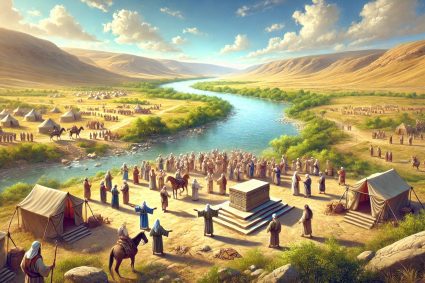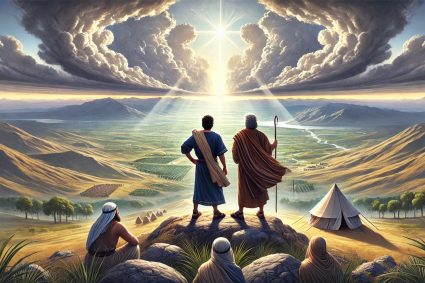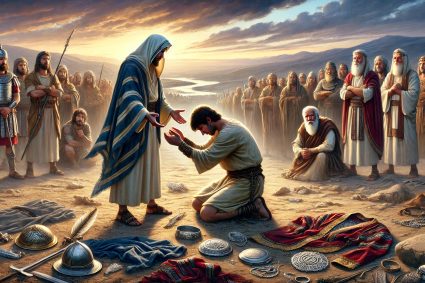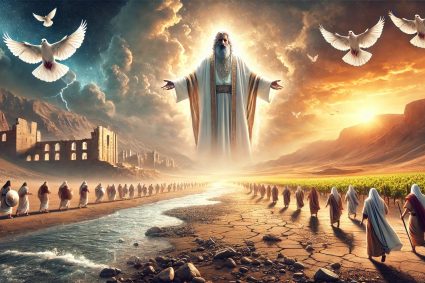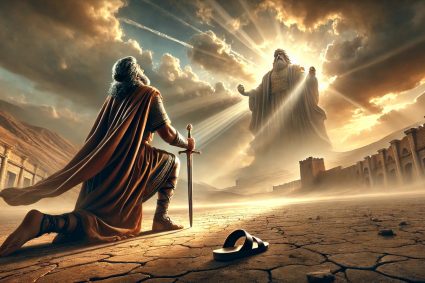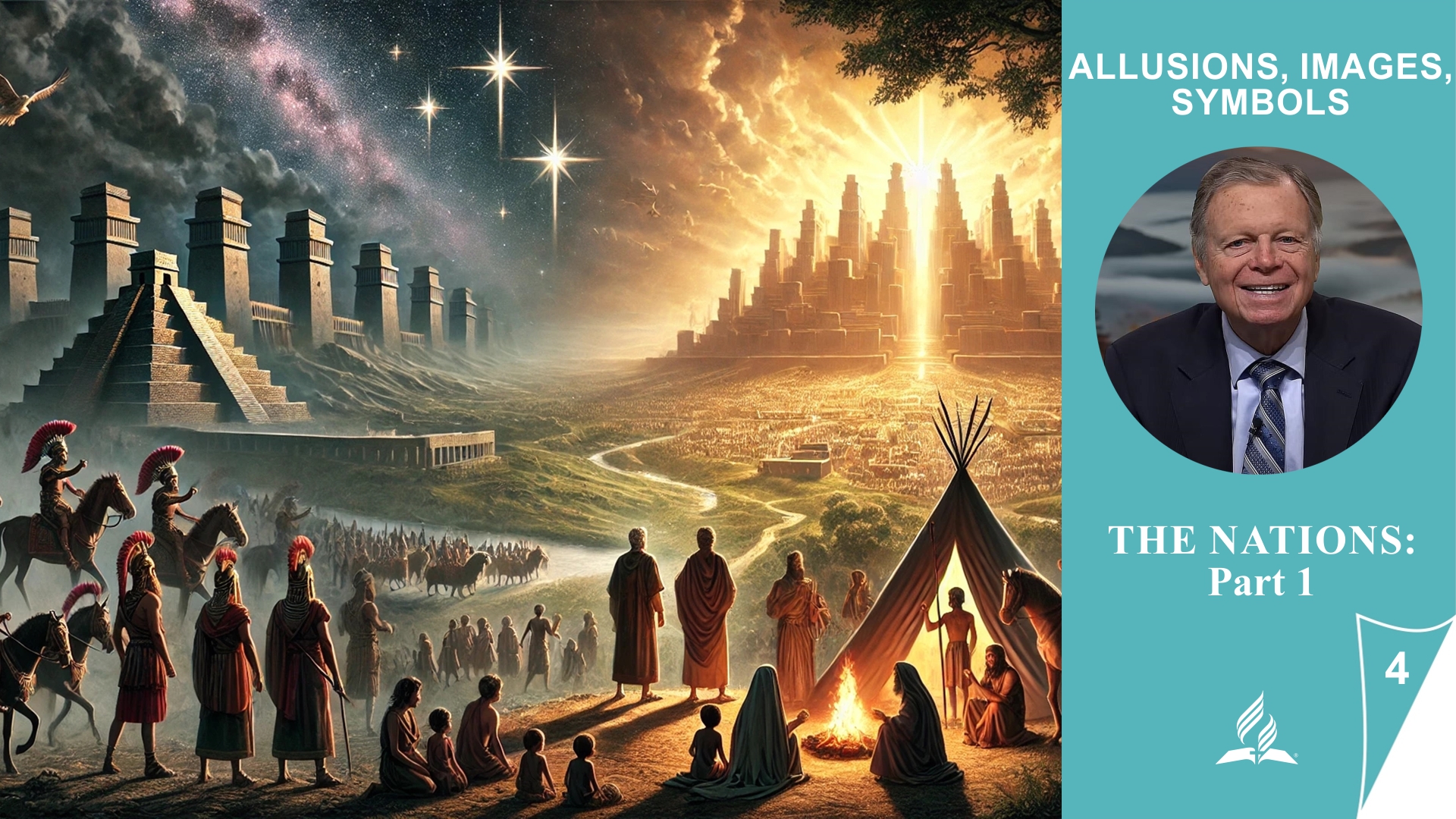
Series ALLUSIONS, IMAGES, SYMBOLS with Pastor Mark Finley |
Lesson 4.The Nations: Part 1 |
God’s Light Amid Human Kingdoms |
Lesson 4 explores the origins of the nations after the Fall and reveals how humanity increasingly distanced itself from God. Instead of trusting God’s guidance, people began building their own kingdoms—with Nimrod as a symbolic figure of rebellion and the pursuit of power. Yet in the midst of this trend, God called Abraham to establish a people that would reflect His character. Israel was to be a living testimony, a light to the Gentiles, and an instrument in God’s plan of salvation. This lesson demonstrates that despite human failure, God continues to pursue His plan for the world—through people willing to trust and follow Him.
Memory Text: Daniel 7:14 – “ ‘Then to Him was given dominion and glory and a kingdom, that all peoples, nations, and languages should serve Him. His dominion is an everlasting dominion, which shall not pass away, and His kingdom the one which shall not be destroyed’ ”
Content:
4.1 Nimrod and Nineveh
Nimrod and the Roots of Rebellion: From Eden to Nineveh
The story of Nimrod illustrates how humanity increasingly strayed from God’s original plan after the Fall. Rather than trusting in God’s leadership, Nimrod pursued power, control, and self-glorification—reflected in the founding of city-states like Nineveh. These cities symbolized human pride and independence from God. The Bible does not portray Nimrod as a hero, but as someone who stood “before the Lord”—in the sense of opposition, not reverence. This form of rebellion is often hard to recognize because it masquerades as progress and strength. To guard against it, we need humility and a daily, intentional alignment with God’s will.
4.2 Abraham’s Call
Abraham’s Call: A New Beginning for God’s Plan
With Abraham’s calling, God initiates a new chapter in human history: He calls one man out of the nations to form a people that will reflect His character and values. This people was to be living proof of what life under God’s reign looks like—a contrast to the godless kingdoms of the world. Abraham was invited to leave behind the familiar and trust in a promise that would stretch across generations. Israel was called to be a light to the nations through obedience and wisdom—a living blessing. Today, too, we as a community of faith are called to reflect God’s character through our lives. It is not enough to know the truth—it must be lived.
4.3 Given What You Asked For
A King Like the Others – Israel’s Consequential Choice
Israel’s desire for a human king stemmed from deep mistrust in God’s leadership and a longing to be like the surrounding nations. The elders sought in a king protection, structure, and power—something tangible that promised them security. But God’s warning was clear: human leadership brings human weakness—exploitation, selfishness, and injustice. Despite divine warnings, the people insisted on their desire and got what they wanted—with all the consequences. This story is a powerful example of the danger in replacing God’s ways with our own ideas. Even today, we face the choice of whether to trust God or to follow human solutions—with similar risks.
4.4 The Rulers of the Gentiles
Power or Service? – The Lesson from Earthly Rulers
Jesus explicitly warned His disciples not to imitate the power structures of the world in the church. Just as Israel once rejected God as King, the church was also tempted to place human authority over divine leadership. The union of church and state—especially beginning with Constantine—brought outward peace but also spiritual decline. Power became more important than service, hierarchy more important than humility—a pattern that often brought suffering and persecution to true believers. History shows that faith is endangered when it seeks worldly approval. Even today, we must stay vigilant so that our churches remain places of service, not systems of domination.
4.5 A Light to the Gentiles
A People for All Nations – God’s Light in a Dark World
From the beginning, Israel was called to be a living expression of God’s grace and truth to the entire world—not exclusive, but exemplary. Instead of judging others, it was to draw nations through faithful living and lead them to knowledge of God. Yet by failing in its calling, conflict often replaced peace. Jesus fulfilled this mission perfectly—as a light in the darkness and an invitation to return to God. Even today, God’s call to His people remains: to be a light to the nations—through love, obedience, and truth. The three angels’ message reveals that our task is not to judge Babylon but to call God’s people out of it—through a credible, Spirit-filled life that reflects God’s glory.
4.6 Summary
From Nimrod to Israel – God’s Plan for the Nations
Lesson 4 shows how humanity, after the Fall, deviated from God’s original plan and sought its own way—often driven by power, rebellion, and pride. Nimrod and cities like Nineveh symbolize this trend. In contrast, God called Abraham to form a people that would reflect His character and become a blessing to all nations. But Israel, too, struggled with the same temptations as the Gentiles and eventually demanded a king—with far-reaching consequences. Jesus reminded His followers that true greatness lies in service, not in rule. The mission remains: God’s people are to be a light to the world and lead others to Him—not through force, but through living truth.
(Visited 21 times, 1 visits today)

